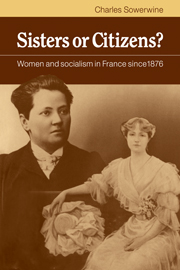Book contents
- Frontmatter
- Contents
- Preface
- Abbreviations of organisations
- Bibliographical abbreviations
- Introduction
- Part I Feminism and socialism 1876–1900
- Part II Origins of the socialist women's movement 1899–1914
- 4 The Groupe Féministe Socialiste 1899–1905
- 5 Women and the SFIO 1905–14
- 6 The Groupe des Femmes Socialistes 1913–14
- Part III Development and decline of the socialist women's movement 1914–79
- Conclusion
- Appendix 1 The Second International and the woman question 1889–1904
- Appendix 2 French socialist women in figures
- Appendix 3 Elisabeth Renaud and the Cambier affair
- Notes
- Bibliography
- Index
6 - The Groupe des Femmes Socialistes 1913–14
Published online by Cambridge University Press: 07 October 2011
- Frontmatter
- Contents
- Preface
- Abbreviations of organisations
- Bibliographical abbreviations
- Introduction
- Part I Feminism and socialism 1876–1900
- Part II Origins of the socialist women's movement 1899–1914
- 4 The Groupe Féministe Socialiste 1899–1905
- 5 Women and the SFIO 1905–14
- 6 The Groupe des Femmes Socialistes 1913–14
- Part III Development and decline of the socialist women's movement 1914–79
- Conclusion
- Appendix 1 The Second International and the woman question 1889–1904
- Appendix 2 French socialist women in figures
- Appendix 3 Elisabeth Renaud and the Cambier affair
- Notes
- Bibliography
- Index
Summary
One evening shortly before Christmas 1912, the wife of a young army captain gave a dinner. It was not a typical military affair: all the guests were women, and socialists into the bargain! Captain Comignan was not put out, however. He was accustomed to his wife's unusual interests. When he had been stationed in Brittany, she had written imitation Celtic verse. In Paris, it had been feminism: she had even written in La Française and had considered herself a disciple of the beautiful ‘neo-Malthusian’ feminist, Nelly Roussel. Then she had wangled a lunch invitation from Paul and Laura Lafargue, shortly before their joint suicide in 1911. On her return from their country home south of Paris, she declared herself a socialist. This was a bit much for an officer's wife. However, understanding her husband's position – she herself was proud of being the ‘daughter, granddaughter, great-granddaughter, wife and sister of French officers’ – she took a pseudonym for her public affairs. Born Marie-Anne-Rose Gaillarde (at Paris on 20 September 1875), she called herself Marianne Rauze: ‘a Rose by any other name’.
Rauze had invited her guests with one purpose: to create a socialist women's group. Among the half dozen women were Elisabeth Renaud and Adele Toussaint-Kassky (Adèle Kassky had married the Allemanist deputy Edmond Toussaint, in 1905). They were now aged sixty-seven and sixty-five, but still ready for action.
- Type
- Chapter
- Information
- Sisters or Citizens?Women and Socialism in France since 1876, pp. 129 - 142Publisher: Cambridge University PressPrint publication year: 1982



